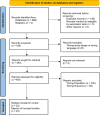Reviewing next of kin regrets in surgical decision-making: cross-sectional analysis of systematically searched literature
- PMID: 36695927
- PMCID: PMC9877257
- DOI: 10.1186/s41687-023-00539-1
Reviewing next of kin regrets in surgical decision-making: cross-sectional analysis of systematically searched literature
Abstract
Background: Decision-making concerning relatives undergoing surgery is challenging. It remains unclear to what extent implicated next of kin eventually regret their decisions and how this regret is assessed. Our aim was to systematically review the literature on decisional regret of next of kin and to describe the assessment tools used and the surgical populations studied.
Methods: We included interventional or observational, quantitative or qualitative studies reporting the measurement of decisional regret of next of kin concerning relatives undergoing surgery. We searched a variety of databases without restriction on publication year. We assessed the quality of reporting of quantitative studies using the NIH Quality Assessment Tool for Observational Cohort and Cross-Sectional Studies and of qualitative studies using the Critical Appraisal Skills Program Checklist.
Results: Thirteen cross-sectional, five prospective cohorts and five qualitative studies matched our inclusion criteria. In 18 studies (78%), patients were children, in five (22%), young or middle-aged adults. No study included elderly or frail patients. Thirteen studies (57%) used the original Decision Regret Scale which was validated for patients, but not for next of kin. Only 3 of the 18 (17%) quantitative studies and only one of the 4 (25%) qualitative studies were rated as "good" in the quality assessment.
Conclusion: None of the retrieved studies used validated tools to assess the decisional regret of next of kin and none of them examined this issue in elderly or frail surgical patients.
Keywords: Next of kin; Regret; Surgery.
© 2023. The Author(s).
Conflict of interest statement
The authors declare that they have no competing interests.
Figures
Similar articles
-
Correlates of regret with treatment decision-making among Japanese women with breast cancer: results of an internet-based cross-sectional survey.BMC Womens Health. 2019 Jul 2;19(1):86. doi: 10.1186/s12905-019-0783-5. BMC Womens Health. 2019. PMID: 31266493 Free PMC article.
-
Parental Decisional Regret after Primary Distal Hypospadias Repair: Family and Surgery Variables, and Repair Outcomes.J Urol. 2016 Mar;195(3):720-4. doi: 10.1016/j.juro.2015.10.118. Epub 2015 Oct 27. J Urol. 2016. PMID: 26518112
-
Factors associated with decisional regret among patients undergoing major thoracic and abdominal operations.Surgery. 2017 Apr;161(4):1058-1066. doi: 10.1016/j.surg.2016.10.028. Epub 2016 Dec 16. Surgery. 2017. PMID: 27993362
-
Patient Participation for Frail Older Persons and Their Next of Kin in Hospital Care-A Scoping Review.Int J Older People Nurs. 2025 May;20(3):e70031. doi: 10.1111/opn.70031. Int J Older People Nurs. 2025. PMID: 40375626 Free PMC article.
-
Shared Decision Making in Surgery: A Meta-Analysis of Existing Literature.Patient. 2020 Dec;13(6):667-681. doi: 10.1007/s40271-020-00443-6. Patient. 2020. PMID: 32880820 Review.
References
Publication types
MeSH terms
LinkOut - more resources
Full Text Sources


